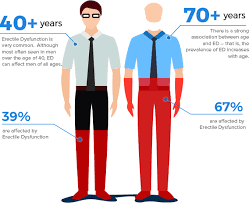Erectile dysfunction (ED) is a common issue that many men face at some point in their lives. But, when does it typically start? Let’s dive into the age-related aspects of erectile dysfunction, its causes, and ways to manage it.
The Age Factor
Erectile dysfunction can affect men of all ages, but the likelihood increases as you get older. Here’s a general breakdown:
-
In Your 20s and 30s: It’s less common but not impossible. ED in younger men is often linked to psychological factors such as stress, anxiety, or relationship issues. Lifestyle choices, including smoking, excessive alcohol consumption, and drug use, can also contribute.
-
In Your 40s: Around this age, the incidence of ED begins to rise. Hormonal changes, such as a decline in testosterone levels, can start to impact sexual function. Additionally, chronic health conditions like diabetes, high blood pressure, and obesity become more prevalent and can affect erectile function.
-
In Your 50s and Beyond: The risk of ED significantly increases. A study published in the journal “Age and Ageing” reported that approximately 40% of men in their 50s experience some degree of ED, and this number rises to about 70% for men in their 70s. Aging-related factors, including reduced blood flow and nerve function, play a major role.
Causes of Erectile Dysfunction
Understanding the causes can help in addressing the issue effectively. The main causes of ED can be divided into two categories: physical and psychological.
Physical Causes
- Cardiovascular Diseases: Conditions like atherosclerosis (hardening of the arteries) can reduce blood flow to the penis.
- Diabetes: This can damage nerves and blood vessels, leading to ED.
- Obesity: Excess weight can lead to hormonal changes and cardiovascular problems.
- Hormonal Imbalances: Low testosterone levels can affect libido and erectile function.
- Medications: Some drugs for high blood pressure, depression, and other conditions can cause ED as a side effect.
- Lifestyle Factors: Smoking, excessive alcohol consumption, and drug use can negatively impact erectile function.
Psychological Causes
- Stress and Anxiety: These can interfere with sexual arousal and performance.
- Depression: Often linked with low libido and erectile problems.
- Relationship Issues: Problems with a partner can lead to ED.
- Performance Anxiety: Worrying about sexual performance can prevent an erection.
Managing Erectile Dysfunction
If you’re experiencing ED, there are several steps you can take:
- Lifestyle Changes: Improving your diet, exercising regularly, quitting smoking, and reducing alcohol intake can have a positive impact on your overall health and erectile function.
- Medical Treatment: Medications like Viagra (Fildena 100 and Malegra 200), Cialis (tadalafil), and Levitra (vardenafil) can help. Consult with a healthcare provider to determine the best option for you.
- Therapy: For psychological causes, counseling or therapy can be very effective.
- Addressing Underlying Conditions: Managing chronic health issues like diabetes and hypertension can improve ED.
- Hormone Therapy: If low testosterone is the issue, hormone replacement therapy might be recommended.
Conclusion
Erectile dysfunction is a common issue that increases with age. While younger men can experience ED, it’s more prevalent in older age groups due to a combination of physical and psychological factors. By understanding the causes and exploring treatment options, men can effectively manage and improve their sexual health. If you’re concerned about ED, don’t hesitate to consult with a healthcare provider to discuss your symptoms and treatment options.

